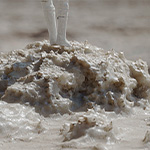Artist Statement
Driven by my curiosity to draw connections between contemporary and historical events, I focus on one of the earliest known revolts of enslaved Southeast Africans, known as the Zanj Rebellion (869-883 CE), which started in Basra, southern Iraq. The Zanj are the Bantu people who had originally been captured from the coast of Southeast Africa and transported to Iraq. They were enslaved to drain the region’s salt marshes to turn the lands ready for agriculture, as well as to mine its salt.
This solo exhibition at Forum Box offers a visual counter-narrative to how history is often written by the victors. It emphasizes the important role of oral storytelling in Arab culture in the of shaping historical narratives and presents the untold voicesof the Zanj across three chapters.
BACKGROUND
The Zanj Rebellion and its relevance to contemporary discourses around decolonial practices and historical injustice have been both enlightening and profound. Spanning fourteen tumultuous years (869-883 CE), this rebellion unfolded in Iraq, notably in the bustling city of Basra. It emerged as a seminal uprising, driven by an enslaved people’s desire for fundamental rights, dignity, and humanity in the face of unspeakable oppression and exploitation.
The Zanj Rebellion and its Leader
At the helm of this historic rebellion stood the enigmatic figure of Ali Ibn Muhammad, whose true origins remain a subject of ongoing debate and intrigue. Fascinated by the life and leadership of Ali, I want to unravel the intricacies of one of history’s longest and bloodiest slave liberation revolutions. Masterminded by this ambitious and evidently charismatic leader, the rebellion employed a myriad of strategies to rally its followers and challenge the oppressive forces of the Abbasid Caliphate (750-1258 CE).
Ali’s shrewdness and cunning were evident in his ability to invoke mysticism and manipulate circumstances to his advantage. By claiming to understand the language of birds, recite unknown verses of the Quran, and even communicate with angels, Ali captivated the hearts and minds of the oppressed, offering them hope in the midst of despair. His strategic manipulation of societal grievances and his poetic rhetoric resonated deeply with those who had endured years of subjugation and exploitation. By promising freedom, land, and social justice, Ali emerged as a beacon of hope and inspiration for the disenfranchised masses, ultimately galvanizing an army of men who had long been deprived of their basic rights and freedoms. Despite facing insurmountable able odds and relentless opposition, Ali Ibn Muhammad’s unwavering determination and visionary leadership left an indelible mark on history, symbolizing the enduring spirit of resistance and the relentless pursuit of freedom and justice.
Chapters – THE REVOLT
CHAPTER 1
UNMATCHED NARRATIVES, displayed in the first gallery space, showcases drawings where the ink bleeds through the paper. Collectively, the drawings resemble a black and white sketchbook that unfolds its pages onto this historical event. Initially, the silhouettes in the drawings take prece-dence, but upon closer inspection, the details ignored or erased from the historical narrative are revealed through mirrors.
Details:
Metal frames: 400mm x 300mm x 200mm / Mirrors: 2950mm x 180mm x 6mm / Acrylic sheets: Â2950mm x 180mm x 3mm / Ink on Canson papers: 2950mm x 180mm x 120g.
CHAPTER 2
DOCUMENTS ON SALT is a series of sculptures crafted from pure salt and showcased in the ad-jacent gallery spaces. This deliberate choice of material highlights the limited resources available to the Zanj for documenting their suffering, with salt serving as their primary medium of expression. Through these sculptures, the Zanj were able to convey their hardships and struggles.
Details:
The installation features sculptures series crafted from natural salt slabs, supported by metal brackets for display. Weights and dimensions may vary.
CHAPTER 3
SALINE LANDS, a one-channel video installation, offers a haunting journey across saline land-scapes, commemorating the final battle of the Zanj rebellion.
Details:
One channel video installation / Duration: 00’05’22’06 min / 4k Digital / stereo / 16:9.
Crew:
Dop: Anton Demerjian / Production assistant: Hassan Abu-Jarar / Motion Control Technician: Ra’ad Al-Swaeer / Dolly grip assistant: Ali Masoud Al-Sufi / Offline editing: Adel Abidin / Online editing and color grading: Martin Jäger / Sound design: Timo Anttila & Jaakko Heikura -Humina Oy.
Artist statement from Forum Box
Image: Adel Abidin. SALINE LANDS. 2024. One-channel video installation. Still. Image courtesy of the artist and Forum Box



